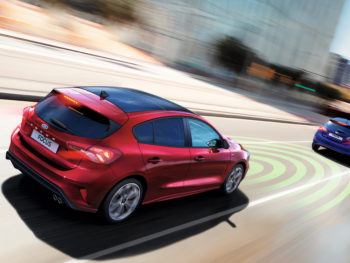Euro NCAP tests to dispel confusion over assisted and automated driving
Euro NCAP has launched new assessments of driver assistance technologies as it warns that automated driving hype is dangerously confusing drivers.

Euro NCAP is testing technologies such as Adaptive Cruise Control in 10 models, including the Ford Focus
New research finds that one in 10 drivers (11%) would be tempted to have a nap while using a so-called ‘Highway Assist’ system, such as Adaptive Cruise Control, with potentially very dangerous implications. Meanwhile 34% would be tempted to text on a mobile phone while 33% would consider making a hand-held call. Only half (51%) of drivers believe they would be liable in the event of a crash when using Assisted Driving systems.
The #TestingAutomation study, commissioned by the UK’s Thatcham Research, Euro NCAP and Global NCAP, also found that 71% of drivers around the world believe they can purchase a self-driving car right now – despite the fact that none are available to the public.
According to Thatcham Research, manufacturer naming and marketing of such systems is fuelling such confusion by leading drivers to believe they can relinquish control.
In response, Euro NCAP has launched assessments of 10 new cars with Driver Assistance technologies to highlight what the systems can and can’t do.
The new assessments compared the performance of Highway Assist systems in the Audi A6, BMW 5 Series, DS 7 Crossback, Ford Focus, Hyundai Nexo, Mercedes-Benz C-Class, Nissan LEAF, Tesla Model S, Toyota Corolla and the Volvo V60.
The tests – which are not yet part of the Euro NCAP safety star rating due to ongoing research – found that different manufacturers have implemented different approaches to the application of driver assistance technologies in terms of the level of assistance given to the driver.
Michiel van Ratingen, Euro NCAP secretary general, said: “Euro NCAP’s message from these tests is clear – cars, even those with advanced driver assistance systems, need a vigilant, attentive driver behind the wheel at all times. It is imperative that state-of-the-art passive and active safety systems remain available in the background as a vital safety backup.”
Matthew Avery, director of research at Thatcham, added: “These new Euro NCAP assessments are a heads-up for drivers on what these systems can and can’t do and starkly shows their limitations, proving beyond any doubt that they are not autonomous.
“The best systems are those that support the driver but leave them in no doubt that they remain in control.”
Besides testing the system’s main functions, Euro NCAP also verified the information provided by the manufacturer in media, commercials or in the user’s manual to check that no false or exaggerated claims are being made, and that the information on the system and its limitations is sufficiently clear and complete – with the results varying among the carmakers.
To access the Euro NCAP research, click here.
The research is backed up by a new video that demonstrates why drivers should not become over-reliant on current Assisted Driving technologies. To watch it, click here.







